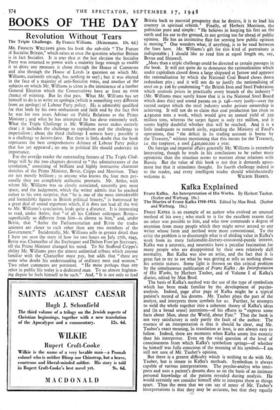BOOKS OF THE DAY
Revolution Without Tears
The Triple Challenge. By Francis Williams. (Heinemann. 10s. 6d.) Mn. FRANCIS WILLIAMS gives his book the sub-title "The Future of Socialist Britain," which raises at once the question whether Britain is in fact Socialist. It is true that at the last election the Socialist Party was returned to power With a majority large enough to enable it to drive any measure it chose through the House of Commons and also through the House of Lords (a question on which Mr. Williams, curiously enough, has nothing to say); but it was elected in the face of a majority of anti-Socialist votes, and another of the^ subjects on which Mr. Williams is silent is the imminence of a further General Election which the Conservatives have at least an even chance of winning. But let that pass. What Mr. Williams has set himself to do is to write an apologia (which is something very different from an apology) of Labour Party policy. He is admirably qualified for that both by his own enthusiasm and faith and by the fact that he was for two years Adviser on Public Relations to the Prime Minister ; and what he has attempted he has done extremely well. What the Triple Challenge is Mr. Williams never makes entirely clear ; it includes the challenge to capitalism and the challenge to imperialism ; about the third challenge I remain hazy ; possibly it is a challenge to laissez-faire. But there is little doubt that the book represents the best comprehensive defence of Labour Party policy that has yet appeared ; no one in political life should underrate its importance.
For the aver;ke reader the outstanding feature of The Triple Chal- lenge will be the two chapters devoted to "the administrators of the revolution," consisting of brilliant and highly instructive character sketches of the Prime Minister, Bevin, Cripps and Morrison. They are not merely brilliant ; to anyone who knows the four men per- sonally they are completely authentic portraits. Mr. Attlee, with whom Mr. Williams was so closely associated, naturally gets most space, and the judgement, which the writer admits that he reached rather to his own surprise, that "he is one of the most considerable and formidable figures in British political history," is buttressed by a great deal of sound argument which, if it does not lead all the way to Mr. Williams's conclusion, leads quite a distance. It is interesting to read, under Attlee, that "of all his Cabinet colleagues Bevin- superficially so different from him—is closest to him," and, under Bevin, that "Attlee the Parliamentarian and &yin the trades unionist are closer to each other than any two members of the Government." Incidentally, Mr. Williams tells in greater detail than I have yet seen the story of how for two hours on July 27th, 1945, Bevin was Chancellor of the Exchequer and Dalton Foreign Secretary, till the Prime Minister changed his mind. To Sir Stafford Cripps's ability Mr. Williams pays the almost unlimited tribute which anyone familiar with the Chancellor must pay, but adds that "there are some who doubt his understanding of ordinary men and women." Two other comments are pertinent. "He more perhaps than any other in public life today is a dedicated man. To an almost frighten- ing degree he feels himself to be such." And, "It is not only to lead Britain back to material prosperity that he desires, it is to lead his country in spiritual rebirth.' Finally, of Herbert Morrison, the politician pure and simple: "He believes in keeping his feet on the earth and his ear to the ground, in not getting too far ahead of public opinion. He has an instinctive flair for sensing how public opinion is moving." One wonders what, if anything, is to be read between the lines here. Mr. Williams's gift for this kind of portraiture is indisputable ; I should like to read him at equal length on, say, Bevan and Shinwell.
_More than a triple challenge could be directed at certain passages in the book. It will not quite do to denounce the rationalisation which under capitalism closed down a large shipyard at Jarrow and approve the rationalisation by which the National Coal Board closes down redundant pits ; and it will not do to justify the nationalising of steel on p. to6 by condemning "the British Iron and Steel Federation which controls prices in practically every branch of the industry" (Mr. Williams must surely know that it is the National Steel Board which does this) and sound paeans on p. 148—very justly—over the record output which the steel industry under private ownership is achieving. It will not do to claim that coal production has risen to 4,240,000 tons a week, which would give an annual yield of 220 million tons, whereas the target figure is only 211 million, and it seems highly doubtful whether that will be reached. And it is a little inadequate to remark airily, regarding the Ministry of Food's operations, that "the deficit in its trading account is borne by the Treasury," without mentioning that this means for the Treasury, i.e. the taxpayer, a cool k400,000,000 a year.
On foreign and imperial affairs generally Mr. Williams is extremely interesting, though he tends in his conclusions to be rather more optimistic than the situation seems to warrant about relations with Russia. But the value of this book is not that it demands agree- ment but that it stimulates thought. Its fourth challenge indeed is to the reader, and every intelligent reader should wholeheartedly


































 Previous page
Previous page